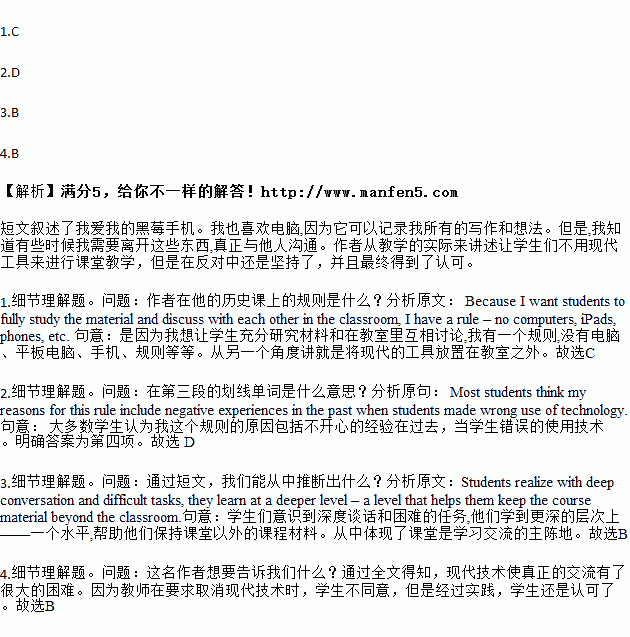题目内容
I love my Blackberry mobile phone – it’s my little connection to the larger world that can go anywhere with me. I also love my computer, as it holds all of my writing and thoughts. However, I know there are times when I need to move away from these things and truly communicate with others.
I teach a course called History Matters in college. My goals for the class include a deep discussion of historical subjects and ideas. Because I want students to fully study the material and discuss with each other in the classroom, I have a rule – no computers, iPads, phones, etc. When students were told my rule, some of them were not happy.
Most students think my reasons for this rule include negative experiences in the past when students made wrong use of technology. There’s a bit of truth to that. I’ve seldom had students make wrong use of technology in my classes; however, I have been e-mailed by students while they were in other teachers’ classrooms.
Some students think that I am anti-technology. There’s no truth in that at all. As I noted above, I love technology and try to keep up with it.
The real reason why I ask students to leave technology at the door is I think there are very few places in which we can have deep conversations. Interruptions (中断) by technology often break students’ thoughts and make them depend too much on outside information for ideas. I want students to dig deep in themselves for ideas. I want them to push each other to think differently and to make connections between the course material and the class discussion.
I have been teaching my history class in this way for many years and the evaluations (评价) show student satisfaction with the environment that I create. Students realize with deep conversation and difficult tasks, they learn at a deeper level – a level that helps them keep the course material beyond the classroom.
I am not saying that I won’t ever change my mind about technology use in my history class, but until I hear a really good reason for the change, I will continue my plan. A few hours of technology-free dialogue is just too sweet to give up.
1.The writer’s rule for his History Matters class is ____.
A.discussing historical ideas deeply
B.studying and discussing the materials
C.leaving technology out of the classroom
D.making right use of technology in class
2.The word “negative” in Paragraph 3 means ____.
A.similar B.unforgettable C.special D.unpleasant
3.What can we infer from the passage?
A.Students make right use of technology in other teachers’ classes.
B.The classroom is one of the good places to have deep conversations.
C.The writer encourages students to agree with others after discussion.
D.Students are unhappy with the writer’s way of teaching history.
4.The writer wants to tell us that ____.
A.technology has different influences in different classes in college
B.technology makes it difficult to have true communication in class
C.history classes can help students to develop their deep thinking
D.it is time for him to give up his teaching method in history class
根据短文内容完成表格中所缺信息,在答题卷上相应的横线上填写答案,每空限填一个单词。
I used to be the messiest (凌乱的) person alive. Over the years, through watching others and by trying again and again, I have finally found ways to come up with plans, organize them and follow through with them.
Make a general list of everything you need to have and do to make your plan happen. Make a list of all steps that need to be completed and think about what needs to be done.
Detail everything completely and read it over so you can start coming up with some good ideas of how to carry out your plans.
You should make sure that if, for some reason, way one doesn’t work, you have way two and way three to depend on. So, different ways are needed at hand. It’s just a matter of being organized. Chances are that there is always more than one way of doing things, and that if one of those ways doesn’t work, one of the others will.
Don’t try to solve more things all at a time. All that does is to slow your progress, take away your attention and make you lose your interest and energy.
Carrying out an effective (有效的) plan requires being as organized as possible. You will only achieve this by sticking to the order of the plan and not changing or trying to do more at a time.
Last but not least, you should never give up things halfway. It will only make everyone around you angry, including yourself. Unfinished plans are a waste of time, energy and, in some cases, even money.
So, don’t be afraid of organization. The older we get, the more necessary it becomes to have the skills to follow through with confidence and to be able to carry through plans in an organized and manageable way. It pays to be organized, after all.
Title: Tips on how to be organized in your life. | |||
Tips | Details | 1. | Conclusion |
Write down your plan. | List everything you need, 2.the steps you will follow. | To make your plan happen. | You shouldn’t be afraid of organization because it is 3. being so. |
4. three Different ways to carry out your plan. | To make sure that you can have some 5. choices when one way doesn’t work. | ||
Do one thing at a time. | Stick to the order of your plan. | To save your interest, motivation and energy. | |
Finish what you have started. | To get your plan carried out completely. |


 B.
B.  C.
C.  D.
D.